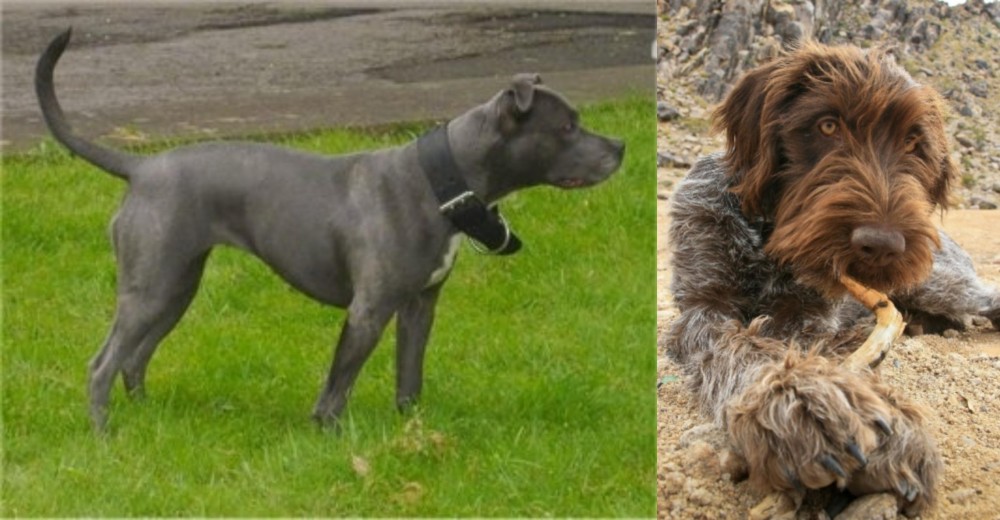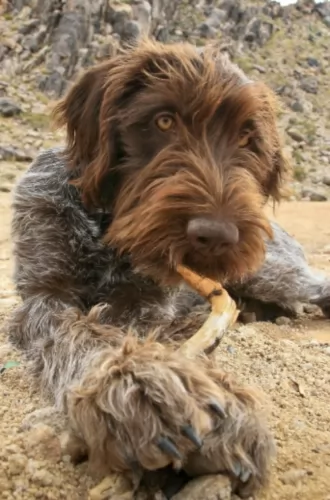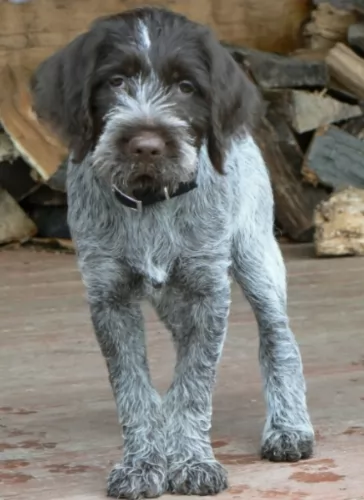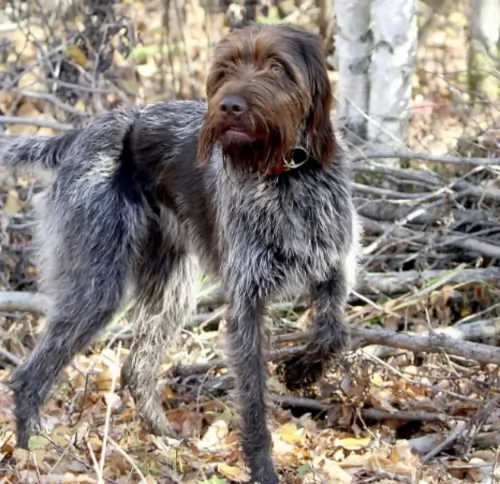 Petzlover
Petzlover Irish Bull Terrier is originated from United Kingdom but Wirehaired Pointing Griffon is originated from France. Irish Bull Terrier may grow 12 cm / 4 inches shorter than Wirehaired Pointing Griffon. Irish Bull Terrier may weigh 9 kg / 19 pounds lesser than Wirehaired Pointing Griffon. Irish Bull Terrier may live 4 years more than Wirehaired Pointing Griffon. Both Irish Bull Terrier and Wirehaired Pointing Griffon has almost same litter size. Irish Bull Terrier requires Low Maintenance. But Wirehaired Pointing Griffon requires Moderate Maintenance
Irish Bull Terrier is originated from United Kingdom but Wirehaired Pointing Griffon is originated from France. Irish Bull Terrier may grow 12 cm / 4 inches shorter than Wirehaired Pointing Griffon. Irish Bull Terrier may weigh 9 kg / 19 pounds lesser than Wirehaired Pointing Griffon. Irish Bull Terrier may live 4 years more than Wirehaired Pointing Griffon. Both Irish Bull Terrier and Wirehaired Pointing Griffon has almost same litter size. Irish Bull Terrier requires Low Maintenance. But Wirehaired Pointing Griffon requires Moderate Maintenance
 The Irish Bull Terrier is a variant of the Staffordshire Bull Terrier and is also known as the Irish Staffordshire Bull Terrie.
The Irish Bull Terrier is a variant of the Staffordshire Bull Terrier and is also known as the Irish Staffordshire Bull Terrie.
The dog isn’t particularly well known outside of Ireland and it is also unrecognized by any kennel clubs, although there are some dog organizations which recognize the Irish Staffordshire Bull Terrier and this includes the Dog Registry of America as well as the United National Kennel Club.
Although descended from the Irish Bulldog and the original Staffordshire Pit Terrier, the breed has also been influenced by other dog breeds such as the English White Terrier among others.
 Known also as the Korthals Griffon, the Wirehaired Pointing Griffon is a hunting- and gundog. It was Eduard Karel Korthals who is thought to have brought about this dog breed around 1873.
Known also as the Korthals Griffon, the Wirehaired Pointing Griffon is a hunting- and gundog. It was Eduard Karel Korthals who is thought to have brought about this dog breed around 1873.
He was a Dutchman living in France. It is believed that quite a few dog breeds were used to bring about this dog such as the Otterhound, Spniels, Setters and possibly a Pointer. The dog is known as a supreme gundog and it is a very popular dog breed.
Edward Korthals of Holland was looking for an ideal gun dog. It was in 1888 that the first Griffon Club was formed. It was only in 1916 that this dog was officially recognized as the Wirehaired Pointing Griffon in the United States.
 Bred essentially for dog fighting, the Irish Bull Terrier, known also as the Irish Staffie, is a medium sized dog which stands at roughly 43 to 48cm and weighs in at anything from 14kg to 18kg.
Bred essentially for dog fighting, the Irish Bull Terrier, known also as the Irish Staffie, is a medium sized dog which stands at roughly 43 to 48cm and weighs in at anything from 14kg to 18kg.
The dog is muscular, lean and strong with a strong jaw, deep chest, a broad head, short muzzle with round, brown eyes. The ears are half-erect and he has a long, straight tail. The coat of the dog is short and smooth and in different shades of red, fawn, black and brindle. Sometimes there are white markings.
The Irish Staffie has an aggressive temperament when it comes to fighting other dogs, but he loves being with a human family, being a social dog.
Those who have owned the dog say he is a courageous, confident, strong-willed, affectionate, loyal pet who is playful and loves getting up to mischief. He is intelligent too and can be easily trained and socialized, getting on well with children in the home.
This dog seems to have a constant grin on his face and he just loves life. He loves working hard and playing hard and even though he has a history of fighting, with people he is loving and devoted.
He is boisterous and better suited to a strong-minded, active family as he tends to be stubborn, wanting his own way. He can adapt well to life in the city or the country, but wherever he lives, he will require his owners to give him a good amount of exercise.
 The Wirehaired Pointing Griffon or Korthals Griffon is a medium-to-large sized dog standing at between 50 and 60cm both male and female and weighing between 23and 27kg.
The Wirehaired Pointing Griffon or Korthals Griffon is a medium-to-large sized dog standing at between 50 and 60cm both male and female and weighing between 23and 27kg.
He has a wiry, somewhat harsh curly outer coat and a softer undercoat. The head is quite large. He has thick eyebrows and a beard. The eyes are brown with yellow irises.
This is a low-shedding dog. There are a few colors such as white and brown, white and orange but the coat is also steel gray with brown markings.
These dogs are intelligent and independent with a desire to please their owners. He is able to learn tricks and commands easily. They love their human families and want to be around them all the time.
It would be devastating for such a dog to find himself stuck in the backyard with no human contact. He is also not suited to cramped living conditions in the city but is essentially a country dog, especially since he has boundless energy.
As a family pet, he is playful, friendly, loyal, loving and gentle, behaving well with children and other pets. They’re not aggressive dogs but they make excellent watchdogs, barking if someone comes into their property.
 Lots of contact from his human family is what your Irish Bull Terrier will want from you. He is a loving, social dog and close human contact as well as lots of good food and exercise is what he will require from you.
Lots of contact from his human family is what your Irish Bull Terrier will want from you. He is a loving, social dog and close human contact as well as lots of good food and exercise is what he will require from you.
With training and socialization he becomes an awesomely obedient pet, getting on well with adults and children in the home. He is such an entertaining, happy dog and once you've had an Irish Bull Terrier you will find your home empty without one.
 The Wirehaired Pointing Griffon has always been a great hunting dog and he doubles as an excellent pet and companion as well.
The Wirehaired Pointing Griffon has always been a great hunting dog and he doubles as an excellent pet and companion as well.
This dog is extremely loyal to his human family and is friendly, intelligent, loving and affectionate, getting on well with children as well as other pets in the home.
He can reach 14 years of age and doesn’t often get sick, making him an all-round great pet and companion.
 Looked after well, your Irish Bull Terrier can reach 14, 15 or 16 years of age. Just like with other dogs, he is prone to some common dog illnesses, of which eye illnesses can be one.
Looked after well, your Irish Bull Terrier can reach 14, 15 or 16 years of age. Just like with other dogs, he is prone to some common dog illnesses, of which eye illnesses can be one.
Production and drainage of fluid is supposed to be balanced in the eye, and Glaucoma comes about when this balance is disrupted. Symptoms include red eye, pain, increased tear production and corneal cloudiness. Your vet may recommend treatment that will decrease inflammation in the eye.
The lens of the eye is usually clear but sometimes it develops a cloudy cataract which blocks light from reaching the back of the eye. The result is poor vision and even blindness. Cataract surgery is available for dogs and your vet can advise you further.
 An Irish Staffordshire Bull Terrier isn't going to require you spending a lot of money on him in terms of grooming. He is a low maintenance dog and his short, smooth coat will only require a good brush once or twice a week as he isn't a heavy shedder.
An Irish Staffordshire Bull Terrier isn't going to require you spending a lot of money on him in terms of grooming. He is a low maintenance dog and his short, smooth coat will only require a good brush once or twice a week as he isn't a heavy shedder.
Brushing him has several advantages – he loves the attention you’re giving him, its a time to check on fleas and ticks and it is excellent conditioning therapy for his coat. A damp cloth can also be used to wipe him down, and this is far better than bathing him with a shampoo that could aggravate his skin.
Your Irish Bull Terrier is an energetic breed and he certainly won't do well in a home where the family leaves him to his own devices day after day in the back yard.
Social and energetic, your pet will want to join you with your daily walks and he finds a ball irresistible. As a responsible dog owner, you will need to see that he gets a fair quota of exercise otherwise you should rather settle for a less active breed.
It goes without saying that such an active dog will require a good diet so ensure he can remain happy and active. Always try and feed your pet the best quality food there is.
If its commercially manufactured food, make sure its high quality and isn’t packed with unwholesome fillers and preservatives. Your vet can always offer sound advice on this aspect.
Some homemade food such as cooked chicken, brown rice and vegetables added to his kibble will do him the world of good and if you can afford it, mix in some raw meat from time to time. Make sure he has access to fresh, cool water.
 This dog loves his exercise, and if you live in the country so much the better. He will love to go hiking and swimming with you or running next to you as you go cycling. He also loves all kinds of rope- and ball games in the garden. It’s why this active dog isn’t ideal for life in the city.
This dog loves his exercise, and if you live in the country so much the better. He will love to go hiking and swimming with you or running next to you as you go cycling. He also loves all kinds of rope- and ball games in the garden. It’s why this active dog isn’t ideal for life in the city.
Spay or neuter your pet if you don’t want unwanted puppies. Don't do it too early. Speak to your vet about the procedure and about the health benefits that come from spaying and neutering a dog.
These are active dogs and they will require top quality food if they’re to remain healthy and active.
Always check the packaging to see what ingredients are present in your dog’s food. Some of the cheaper, more inferior brands can actually be harmful to your pet with their useless ingredients devoid of vitamins and minerals.
Some home-made food is good and this needs to be plain and free from spicy additives. Dogs have sensitive stomachs and anything unusual can cause them digestive problems.